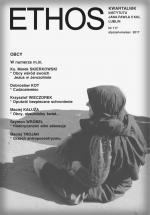„INNOŚĆ ZWIERZĘCIA”. O kłopotliwej relacji Homo sapiens z resztą królestwa Animalia
“The ‘Otherness’ of Animals.” On the Troublesome Relationship between Homo sapiens and the Other Members of the Kingdom Animalia
Author(s): Dominika DzwonkowskaSubject(s): Christian Theology and Religion, Anthropology, Sociology
Published by: Katolicki Uniwersytet Lubelski Jana Pawła II - Instytut Jana Pawła II, Wydział Filozofii
Keywords: animal ethics; animal liberation; anthropocentrism; Anthropocene; responsibility towards the other
Summary/Abstract: The human-animal relationships are marked by ambiguity due to the anthropocentric paradigm prevailing in culture. The paper presents some chosen manifestations of this ambiguity, as well as animals as ‘others,’ or ‘strangers,’ in the human world, thus delving deeper into the meaning of the relation in question. As it turns out, the problem is multidimensional and in order to approach it one needs to scrutinize a number of specifi c issues. First of all, the ‘trouble’ lies in that the language applied in the debate on animal ethics, which is supposed to bridge the interspecies gap, apparently legitimizes it. Another metatheoretical difficulty emerges once we attempt to formulate an adequate research question that would enable creating an ethics that applies to human beings as well as to animals in all their variety. Thus the basic problem lies in establishing the universal criteria necessary to include all the members of the Kingdom Animalia in the moral universe. The paper comprises a critical analysis of the debate on the status of animals in the human world as well on the issue of animal rights. The analysis in question opens new possibilities for further discussion of the ‘troublesome’ relationship between humans and animals. The paper also shows that the long-time efforts of the animal liberation movement have done very little to improve the conditions in which animals live. Animals are still ‘strangers’ in the human world. The task of creating an ethics that would embrace both humans and animals, in all their variety, regardless of the extent of their likeness to humans, proves extremely difficult. The author shows that under the guise of concern for the well-being of animals anthropocentric attitudes are pursued, which once again prompts the question about the nature of the relationship between humans and animals in the age of Anthropocene. The weakness of the debate on animal welfare lies in its being thoroughly anthropocentric due to the fact that it is continued on the grounds of the belief that animals ‘deserve’ care from humans insofar as they manifest ‘human’ traits. Still the debate in question is itself a proof of how ‘troublesome’ the relationship between humans and animals turns out in practice.
Journal: Ethos. Kwartalnik Instytutu Jana Pawła II KUL
- Issue Year: 30/2017
- Issue No: 1
- Page Range: 193-206
- Page Count: 14
- Language: Polish
- Content File-PDF

